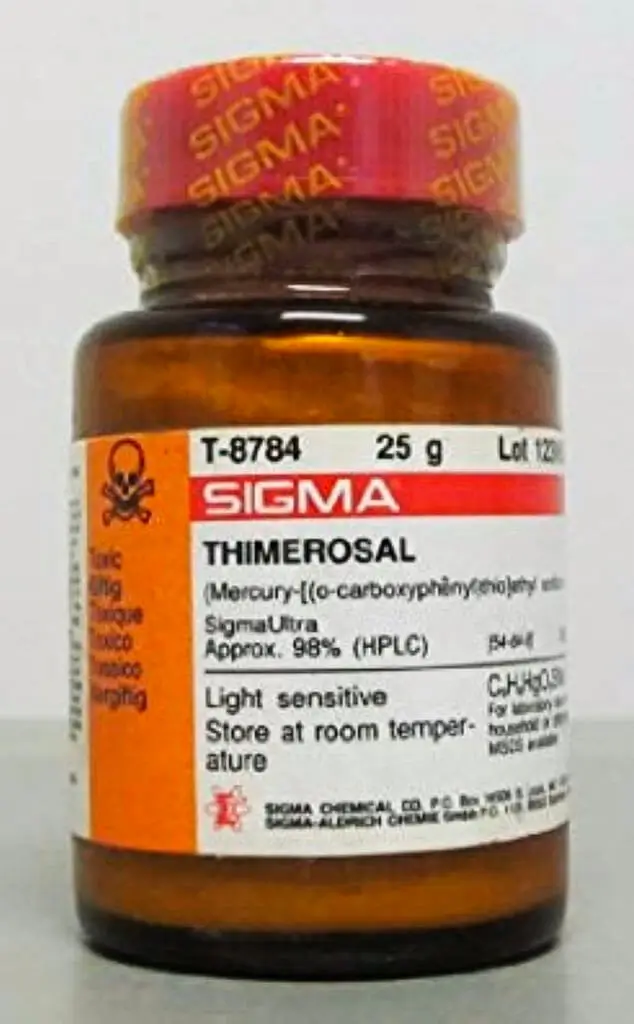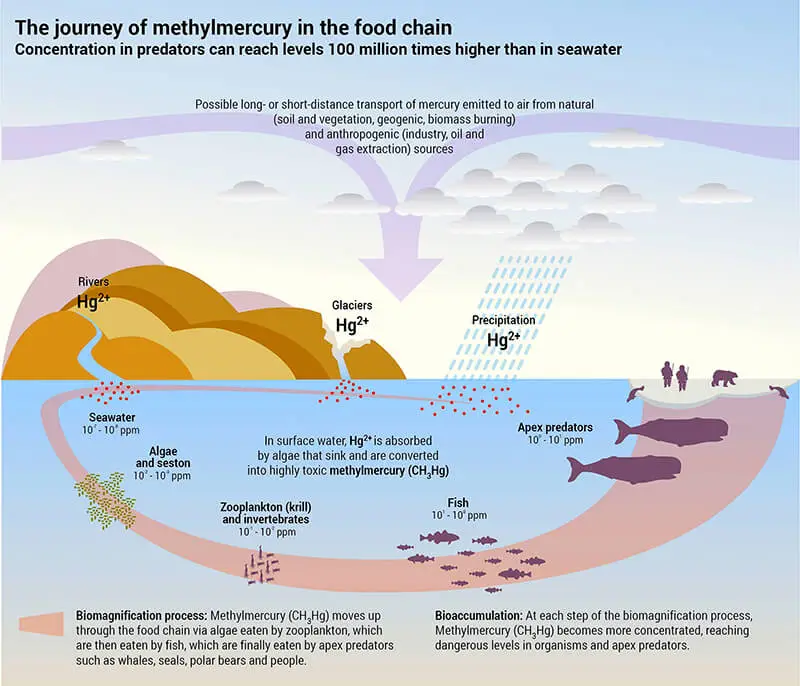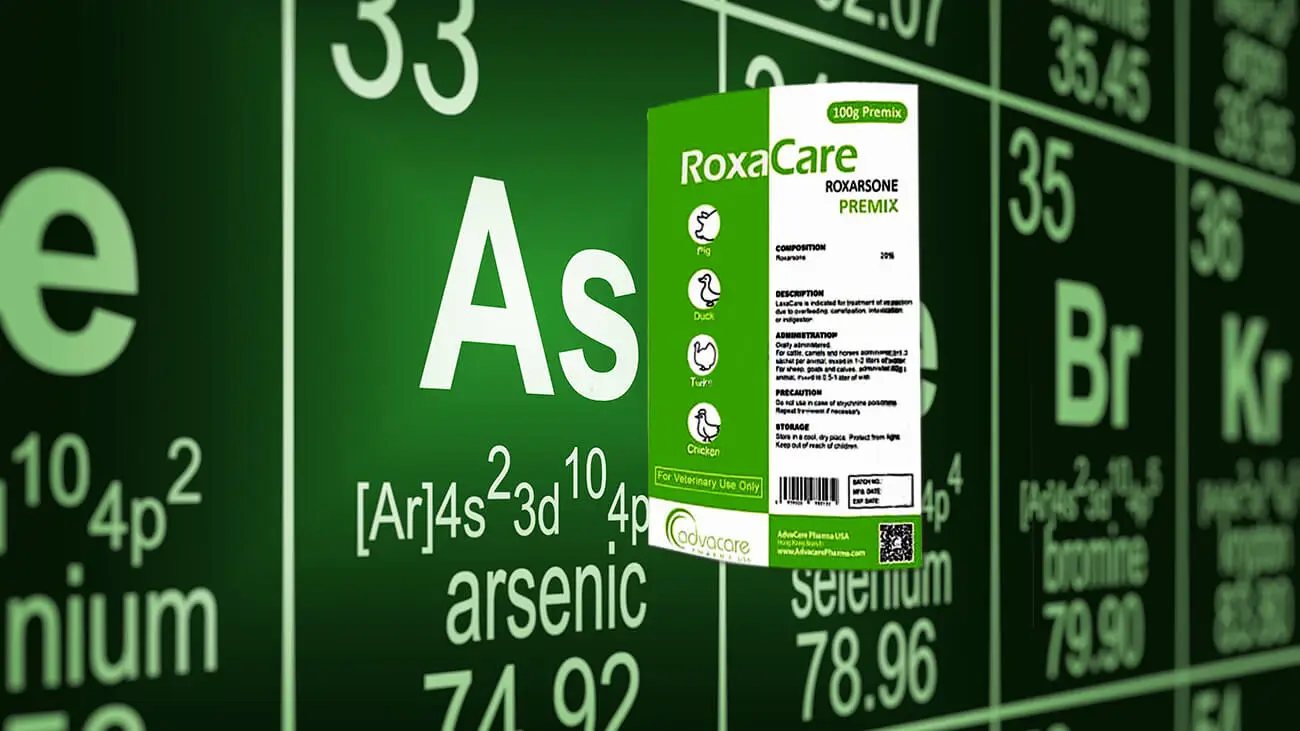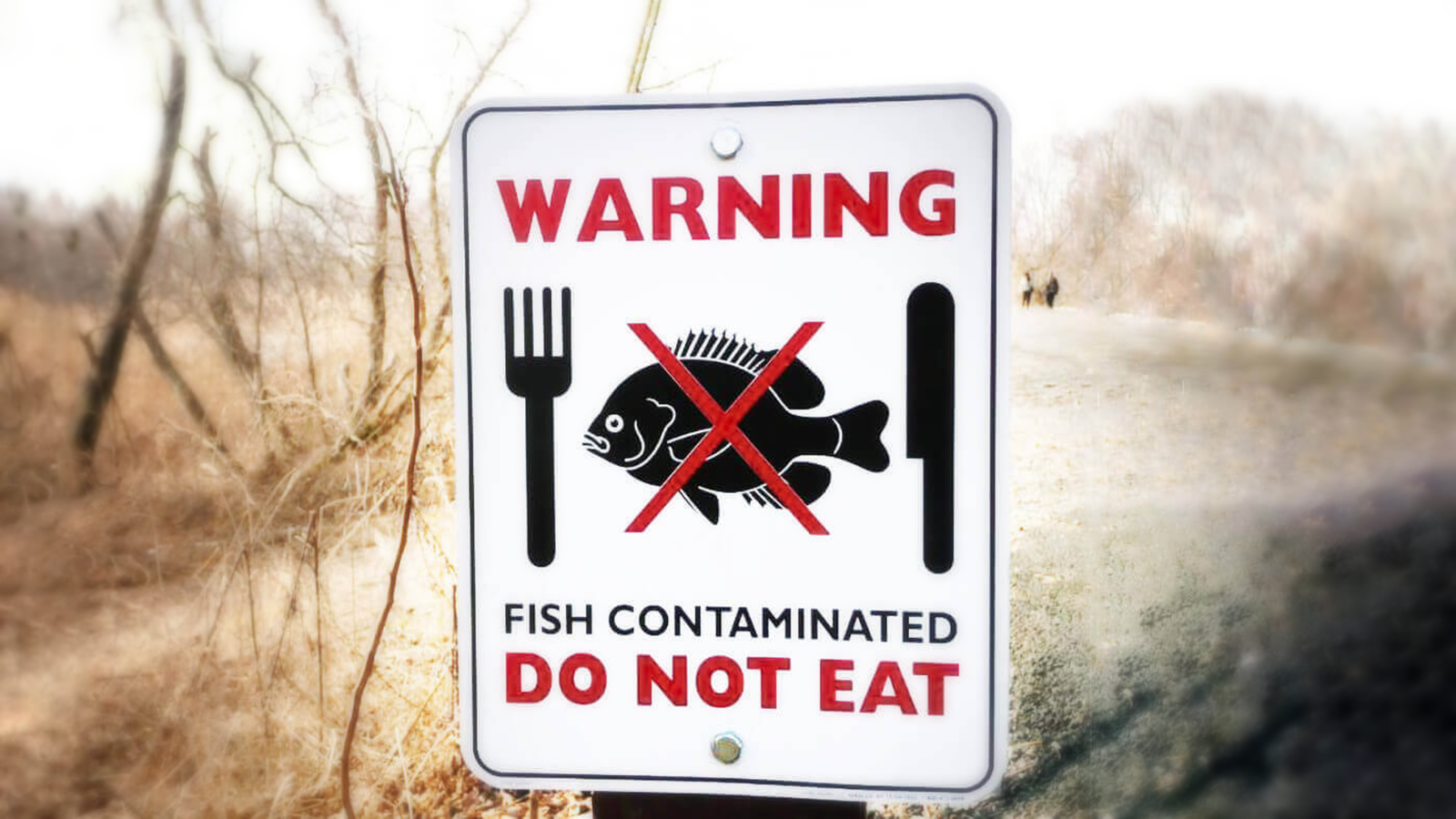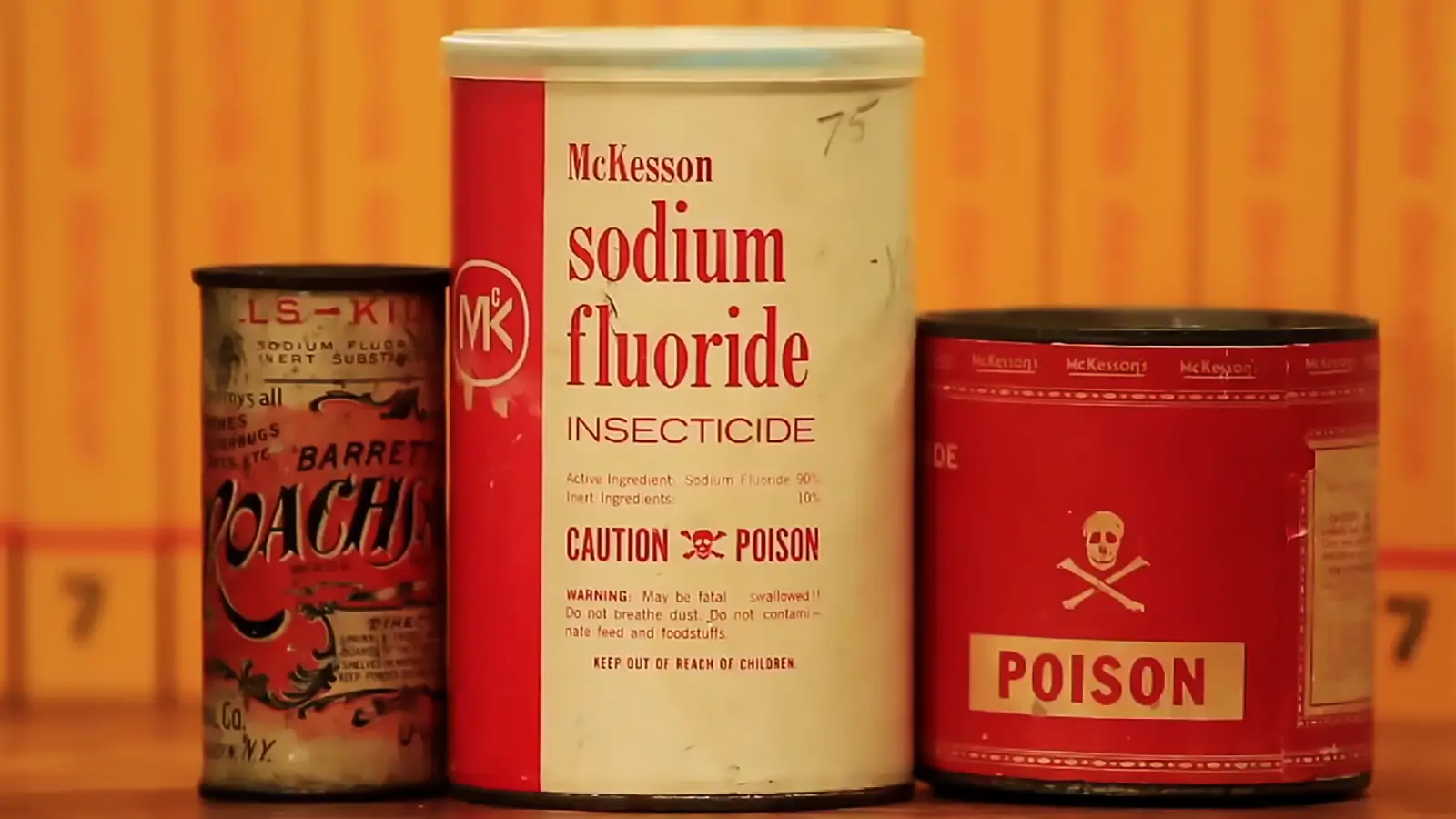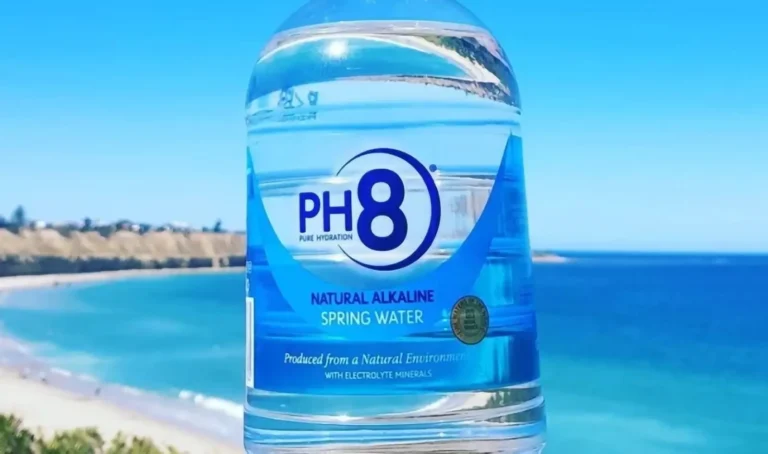Mercury- Neurotoxin from the fish
Mercury is an industrial toxin and the most neurotoxic substance known. Plankton will absorbe it from seawater and initiate bioaccumulation in the food chain.
Milos Pokimica
Written By: Milos Pokimica
Medically Reviewed by: Dr. Xiùying Wáng, M.D.
Updated June 9, 2023We are being taught to think of fish as a healthy form of meat or at least a form that is a healthier and better choice. The reason is that fish has all of the healthy omega-3 fatty acids that we need for our brains. We need to get omega-3 fatty acids from food to prevent age-related cognitive decline. There are no omega 3 inland animals if there are not deliberately fed with flaxseed like in the case with omega 3 eggs. Omega 3 eggs are like conventional eggs except that chicken feed is supplemented with an omega-3 source like flax seeds. Fish get them from algae that actually produce them and then when fish eat algae it will get passed around through the food chain. Also, fish tends to have fewer calories than other meat sources but that might not always be the case.
The problem is that there are more than just the omega-3 fats in fish that comes from seawater. Everything that is in the water no matter how minute the concentration the algae will filter out and concentrate tens and hundreds of times more. One thing that will be present in seawater that is not present in freshwater and that plankton will pick up, and also algae, and that will then bioaccumulate in the food chain is one of the most neurotoxic substances known to mankind. Mercury.
We are being taught to think of poisons in a dose-dependent manner because that is how modern medicine works. Something is poison, but it has a low concentration so it is ok. Some side effects and so on. “The dose makes the poison” (Latin: “sola dosis facit venenum”). It is an adage intended to indicate a fundamental principle of toxicology. It is credited to Paracelsus, the alchemist, and father of modern medicine. Now, this is correct for some chemicals but not for all of them. Some toxins do damage, and I will argue most of them do damage in any exposure. This means that if we ingest even one molecule of a substance, it would cause damage. That damage would not be enough to kill us, but the damage will happen.
An excellent example of this is mercury. It is so toxic for our brain that it kills brain cells upon contact. Neurologic damage is most severe in utero. Mercury upon contact with neurons causes neuronal atrophy. When it enters the brain no matter what concentration, even one atom of it, it will do severe damage. If exposure is significant, it will cause severe neuronal atrophy with no chance of recovery. Long-term studies have demonstrated that even minuscule prenatal exposure at very low concentrations can cause a detectable loss in the areas of memory, language, and motor function. Children are so sensitive to it, so if affected, they may have hearing loss, visual loss, seizure disorders, developmental delay, and long-term stigmata including motor impairment. For a pregnant woman, it is forbidden to eat tuna in any amount. Also, your brain and body can be exposed to toxic mercury through a number of other ways as well, from getting a flu shot to having a dental filling. To be reasonable here, one can of tuna has more mercury in it than 100 vaccines. Studies have found that people with amalgam dental fillings can have mercury vapor concentrations ten times higher than those in people without them.
Fish consumption provides nutrients but also provides methyl-mercury. All marine fish, not just tuna, contain methylmercury (MeHg), some more and some less. Because the toxic effect of mercury is most destructive during brain development, prenatal exposure is of the most significant concern. Mercury is a cardiac toxin as well, not just the brain one. I will give an example here to put things into perspective.
In this study (Oken et al., 2008) they analyzed connections of children’s susceptibility to mercury both from pregnancy exposure from mother and from fish consumption. Thimerosal from vaccines was looked into as well as dental amalgam impacts on child neurodevelopment. Vaccines in the past used something called thimerosal, which is a preservative containing mercury. To put this into perspective.
Eating a single serving of tuna had the same mercury level as 100 (one hundred) thimerosal vaccines.
The summary of the study was:
“Exposure to mercury may harm child development. Interventions intended to reduce exposure to low levels of mercury in early life must, however, be carefully evaluated in consideration of the potential attendant harm from resultant behavior changes, such as reduced docosahexaenoic acid exposure from lower seafood intake, reduced uptake of childhood vaccinations, and suboptimal dental care.”
Thimerosal has been taken out from most of the vaccines young children get in 2001, with the exception of the flu vaccine, which still contains small amounts. However, how about something one hundred times worse. One single serving of canned tuna. How many servings have we eaten in our lifetime? How about all the other fish? It is not just tuna, all fish has mercury some more some less and it is not just mercury. I use mercury here only as an example. There is a whole list of other heavy metals like mercury that will remain in our ocean for eternity and will never biodegrade because they are elemental particles. Also, there are a thousand other non-organic resistant pollutants that also didn’t degrade and bioaccumulate and microplastic, and the list goes on. The reason this toxin is highly concentrated and highly toxic in such levels in tuna is that tuna is a predatory fish at the top of the food chain. On the bottom of a food chain are plankton and algae that filter the seawater and then the concentration will get ten to a hundred times that in the water but that will still be low. Then these substances start to accumulate as we move up the food chain. As the bigger fish eat the smaller fish it eats all of its toxins as well. When we arrive at the top of the food chain the situation is as it is. The only solution is to go low on the food chain.
Do not eat meat from the oceans, and especially do not eat predatory fish like tuna. Even molecularly distilled DHA supplements are proven to be polluted with heavy metals and toxins. Even krill oil people have begun to substitute instead of fish oil to avoid pollution was proven to be polluted. Krill has a very short life and krill oil was still highly polluted. If you want omega 3’s then just eat flax. Flax has lignans that have a wide range of health benefits including breast cancer prevention and minerals and fiber and is one of the healthiest food items you can get. If you want a supplement as a vegan you can still get algae-based DHA oil. Never and I will repeat this never eat anything from the sea even if you are pregnant or if you are a child if it is from the oceanic animal kingdom ever period, vegan or not. If you eat tuna and expecting a baby you just lowered your baby’s IQ by a measurable amount or worse.
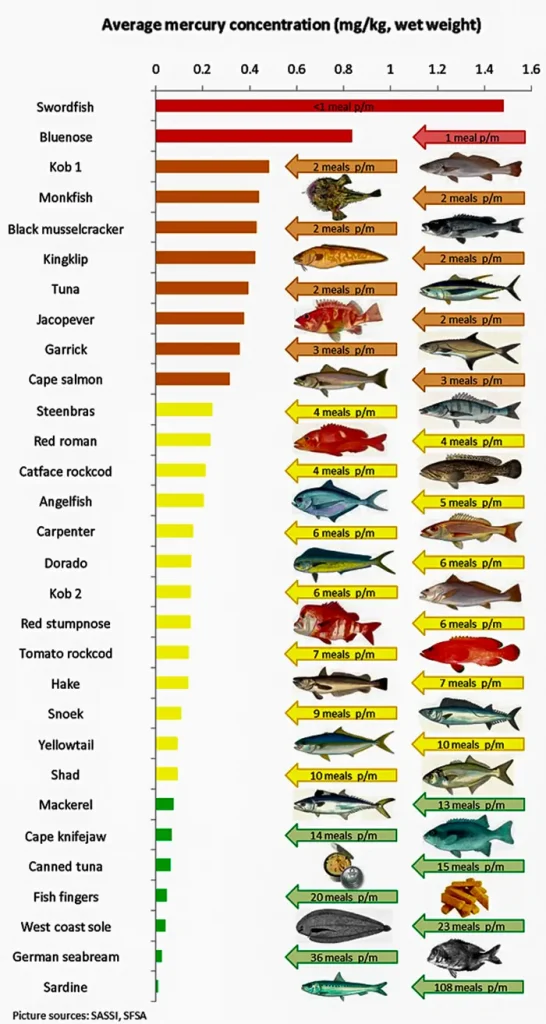
There was a big public concern and mistrust in vaccines and the possibility of links with autism and other diseases. However, there was no public outcry about fish consumption. Fish toxicity is the number one source of mercury in the world. Mercury in fish is so concentrated that by all accounts some of the fish species should be forbidden by law to be used as human food. One single serving is worse than all of the vaccines your child will receive in your life if we look at mercury levels only that is.
What about cadmium?
What about PCBs, PBDEs, dioxins, and chlorinated pesticides?
Because mercury is a neurotoxin, it was thought it was the underlying cause of the connection between autism and vaccination. Today more children get autism even without mercury in vaccines and the estimate is that this number will grow. This is a big subject to analyze, and I will say that most vaccines can be dangerous just by themselves and can cause harm but they do save a lot of lives and in the end, it remains the question of trust in the companies that supply those vaccines.
References:
- Oken, E., & Bellinger, D. C. (2008). Fish consumption, methylmercury and child neurodevelopment. Current opinion in pediatrics, 20(2), 178–183. https://doi.org/10.1097/MOP.0b013e3282f5614c
Related Posts
Do you have any questions about nutrition and health?
I would love to hear from you and answer them in my next post. I appreciate your input and opinion and I look forward to hearing from you soon. I also invite you to follow us on Facebook, Instagram, and Pinterest for more diet, nutrition, and health content. You can leave a comment there and connect with other health enthusiasts, share your tips and experiences, and get support and encouragement from our team and community.
I hope that this post was informative and enjoyable for you and that you are prepared to apply the insights you learned. If you found this post helpful, please share it with your friends and family who might also benefit from it. You never know who might need some guidance and support on their health journey.
– You Might Also Like –

Learn About Nutrition
Milos Pokimica is a doctor of natural medicine, clinical nutritionist, medical health and nutrition writer, and nutritional science advisor. Author of the book series Go Vegan? Review of Science, he also operates the natural health website GoVeganWay.com
Medical Disclaimer
GoVeganWay.com brings you reviews of the latest nutrition and health-related research. The information provided represents the personal opinion of the author and is not intended nor implied to be a substitute for professional medical advice, diagnosis, or treatment. The information provided is for informational purposes only and is not intended to serve as a substitute for the consultation, diagnosis, and/or medical treatment of a qualified physician or healthcare provider.NEVER DISREGARD PROFESSIONAL MEDICAL ADVICE OR DELAY SEEKING MEDICAL TREATMENT BECAUSE OF SOMETHING YOU HAVE READ ON OR ACCESSED THROUGH GoVeganWay.com
NEVER APPLY ANY LIFESTYLE CHANGES OR ANY CHANGES AT ALL AS A CONSEQUENCE OF SOMETHING YOU HAVE READ IN GoVeganWay.com BEFORE CONSULTING LICENCED MEDICAL PRACTITIONER.
In the event of a medical emergency, call a doctor or 911 immediately. GoVeganWay.com does not recommend or endorse any specific groups, organizations, tests, physicians, products, procedures, opinions, or other information that may be mentioned inside.
Editor Picks –
Milos Pokimica is a doctor of natural medicine, clinical nutritionist, medical health and nutrition writer, and nutritional science advisor. Author of the book series Go Vegan? Review of Science, he also operates the natural health website GoVeganWay.com
Latest Articles –
Plant Based News
-
New Netflix Documentary Highlights Impact Of Fishing On Sharks
on July 4, 2025
-
NotCo And Doritos Launch Flamin’ Hot Plant-Based Chicken Nuggets And Mayo In Chile
on July 4, 2025
-
Iconic US National Parks To Get 50% Plant-Based Menus
on July 4, 2025
-
Kung Pao Chickpeas Stir Fry
on July 4, 2025
-
The Secret To Perfect Carrot Hot Dogs
on July 3, 2025
-
These Raw Apple Pie Bars Are Gluten-Free And Vegan
on July 3, 2025
-
Switzerland Rolls Out Labels Flagging Animal Suffering In Food Products
on July 3, 2025
Top Health News — ScienceDaily
- Parkinson’s reversal? One drug brings dying brain cells back to lifeon July 4, 2025
Stanford researchers discovered that dialing down an overactive enzyme, LRRK2, can regrow lost cellular “antennae” in key brain cells, restoring vital dopamine communication and neuroprotective signals in a mouse model of genetic Parkinson’s. After three months on the LRRK2-blocking drug MLi-2, damaged circuits revived and early signs of neuronal recovery emerged, hinting that timely treatment could not only halt but reverse disease progression—and perhaps benefit other Parkinson’s […]
- AI spots deadly heart risk most doctors can’t seeon July 3, 2025
An advanced Johns Hopkins AI model called MAARS combs through underused heart MRI scans and complete medical records to spot hidden scar patterns that signal sudden cardiac death, dramatically outperforming current dice-roll clinical guidelines and promising to save lives while sparing patients unnecessary defibrillators.
- Even low levels of air pollution may quietly scar your heart, MRI study findson July 3, 2025
Breathing polluted air—even at levels considered “safe”—may quietly damage your heart. A new study using advanced MRI scans found that people exposed to more air pollution showed early signs of scarring in their heart muscle, which can lead to heart failure over time. This damage showed up in both healthy individuals and people with heart conditions, and was especially noticeable in women, smokers, and those with high blood pressure.
- Sweet-smelling molecule halts therapy-resistant pancreatic canceron July 3, 2025
A compound best known for giving almonds and apricots their aroma may be the key to defeating hard-to-kill cancer cells. Japanese researchers found that benzaldehyde can stop the shape-shifting ability of aggressive cancer cells, which lets them dodge treatments and spread. By targeting a specific protein interaction essential for cancer survival—without harming normal cells—benzaldehyde and its derivatives could form the basis of powerful new therapies, especially when combined with […]
- Why anger cools after 50: Surprising findings from a new menopause studyon July 3, 2025
Anger isn’t just a fleeting emotion—it plays a deeper role in women’s mental and physical health during midlife. A groundbreaking study tracking over 500 women aged 35 to 55 reveals that anger traits like outbursts and hostility tend to diminish with age and menopause progression. This shift could signal enhanced emotional regulation during and after the reproductive transition. Surprisingly, the only form of anger that remained steady was suppressed anger.
- This sun-powered sponge pulls drinking water straight from the oceanon July 3, 2025
In a leap toward sustainable desalination, researchers have created a solar-powered sponge-like aerogel that turns seawater into drinkable water using just sunlight and a plastic cover. Unlike previous materials, this new 3D-printed aerogel maintains its efficiency at larger sizes, solving a key scalability issue. In outdoor tests, it produced clean water directly from the ocean without any electricity, pointing to a future of low-cost, energy-free freshwater production.
- The fatal mutation that lets cancer outsmart the human immune systemon July 3, 2025
Scientists at UC Davis discovered a small genetic difference that could explain why humans are more prone to certain cancers than our primate cousins. The change affects a protein used by immune cells to kill tumors—except in humans, it’s vulnerable to being shut down by an enzyme that tumors release. This flaw may be one reason treatments like CAR-T don’t work as well on solid tumors. The surprising twist? That mutation might have helped our brains grow larger over time. Now, researchers […]
PubMed, #vegan-diet –
- Exploring the role of gut microbiota in rheumatoid arthritis: the effects of diet and drug supplementationon July 2, 2025
Rheumatoid Arthritis (RA) is a chronic autoimmune disease that mostly breaks out at the joints. It further causes bone erosion and decreased life quality due to severe pain. Current drugs are mainly focused on reducing pain, but unable to terminate the disease progression. This study aims to determine the effect of diet types (Western, Vegan and Mediterranean) on RA progression. Some dietary supplements and drug administration (Huayu-Qiangshen-Tongbi formula or Leflunomide plus Methotrexate) […]
- Blood biomarkers of Alzheimer’s disease in Australians habitually consuming various plant-based dietson June 30, 2025
BackgroundEvidence suggests that plant-based diets (PBDs) may be protective against neurodegenerative diseases such as Alzheimer’s disease (AD).ObjectiveThis study examined associations between blood-based AD biomarkers in individuals 30-75 years without current or diagnosed cardiovascular disease following different PBDs versus regular meat-eating diets (RMEs).MethodsThis secondary analysis of the Plant-based Diets study measured Aβ(1-42)/Aβ(1-40), p-tau181, NFL, and GFAP in 237 plasma […]
- Zinc supplementation among zinc-deficient vegetarians and vegans restores antiviral interferon-α response by upregulating interferon regulatory factor 3on June 28, 2025
CONCLUSION: We identified zinc-dependent IRF3 expression as an essential cellular mechanism behind impaired IFNα response in zinc-deficient subjects. This may contribute to disturbed antiviral immunity and cause increased susceptibility to virus infections in vivo. Oral zinc supplementation effectively restored IRF3 and IFNα levels. Hence, nutritional interventions may become increasingly important in order to prevent health implications from micronutrient deficiencies among vegetarians and…
- Micronutrient intake and nutritional status in 16-to-24-year-olds adhering to vegan, lacto-ovo-vegetarian, pescatarian or omnivorous diets in Swedenon June 26, 2025
CONCLUSION: Youth, regardless of dietary practice, need support to ensure adequate micronutrient intakes, particularly for vitamin D and selenium. Further research is required to evaluate iodine nutrition in Swedish youth.
- Integrating comparative genomics and risk classification by assessing virulence, antimicrobial resistance, and plasmid spread in microbial communities with gSpreadCompon June 26, 2025
CONCLUSIONS: The gSpreadComp workflow aims to facilitate hypothesis generation for targeted experimental validations by the identification of concerning resistant hotspots in complex microbial datasets. Our study raises attention to a more thorough study of the critical role of diet in microbial community dynamics and the spread of AMR. This research underscores the importance of integrating genomic data into public health strategies to combat AMR. The gSpreadComp workflow is available at…
Random Posts –
Featured Posts –

Latest from PubMed, #plant-based diet –
- Low-Carbohydrate Diet Patterns That Favor High-Quality Carbohydrates Are Associated with Beneficial Long-Term Changes in Biomarkers of Inflammation and Oxidative Stress in the Framingham Offspring…by Ghaida F Aloraini on July 4, 2025
CONCLUSIONS: LCD patterns that preserved high-quality carbohydrates while replacing low-quality carbohydrates sources, such as refined grains and added sugars, with fat and protein were inversely associated with inflammation and oxidative stress score, potentially lowering chronic disease risk.
- Linking the Planetary Health Diet Index to sarcopenia: the mediating effect of the non-high-density lipoprotein cholesterol to high-density lipoprotein cholesterol ratio (NHHR)by Huan Chen on July 4, 2025
CONCLUSION: This study highlights the observed negative correlation between PHDI and sarcopenia, with NHHR acting as a partial mediator. These findings emphasize the potential importance of dietary patterns in strategies aimed at preventing sarcopenia.
- Design and conduct of a full diet-controlled, parallel, 2-week residential trial for diabetes prevention without weight loss in Asian Chinese and European Caucasian adults with prediabetes: the New…by Ivana R Sequeira-Bisson on July 4, 2025
BACKGROUND: The causal underpinning of increased metabolic risk and previously observed dichotomous plasma metabolome in Asian Chinese vs. European Caucasian remains undetermined and may be hypothesised as attributed to ethnicity (genetic background), pathology (dysglycaemia) and/or lifestyle (habitual diet). We aimed to investigate the underlying cause(s) and the effect of dietary intervention on biomarkers of type 2 diabetes (T2D) in cohorts with prediabetes. The diets are a generic current…
- Cultural adaptation and psychometric validation of the Turkish MIND diet adherence scale for young adultsby Özge Esgin on July 3, 2025
CONCLUSIONS: The Turkish adaptation of the MIND Diet Adherence Scale can be utilized in its entirety, without the need to remove any items. This study affirms that the MIND Diet Adherence Scale is a valid and reliable measurement tool for assessing dietary habits in Turkish society.
- Effectiveness of dietary interventions in managing pediatric gastroesophageal reflux disease: a comprehensive systematic reviewby Abdulrahman A Alnaim on July 3, 2025
CONCLUSION: Although current evidence remains limited, this review highlights promising dietary strategies-especially plant-based diets and probiotics-for managing pediatric GERD. Future research should focus on personalized nutrition and long-term effectiveness to validate these non-pharmacological interventions.
- Association between pulp stone and Mediterranean diet: a clinical and radiographic studyby Nuray Bağcı on July 3, 2025
CONCLUSION: Based on the findings presented in this study, it can be said that there is an association between the pulp stone and the MedDiet and that the MedDiet nutrition increases the pulp stone.
